- Home
- Stephen Crane
The O'Ruddy: A Romance Page 5
The O'Ruddy: A Romance Read online
Page 5
CHAPTER V
"Your 'papers'?" said Forister. "Damn you and your papers. What wouldI know of your papers?"
"I mean," said I fiercely, "the papers that you stole out of mychamber in the inn at Bristol."
The man actually sank back in his chair and laughed me up to the roof.
"'Papers'!" he shouted. "Here's the king of the Irelands thinking thatI have made off with his papers!"
"You choose a good time for laughing," said I, with more sobriety. "Ina short time you will be laughing with the back of your head."
He sat up and looked at me with quick decision.
"Now, what is all this rubbish about papers?" he said sharply. "Whathave I to do with your filthy papers? I had one intention regardingyou,--of that I am certain. I was resolved to kill you on the firstoccasion when we could cross swords, but--'papers'--faugh! What do youmean?"
The hoarse voice of Jem Bottles broke in from somewhere behind me. "Wemight easily throw him to the earth and tie him, sir, and then makesearch of him."
"And you would know how to go about the business, I warrant me,"laughed Forister. "You muzzle-faced rogue, you!"
To my astonishment the redoubtable highwayman gave back before theeasy disdain of this superior scoundrel.
"My ways may not always have been straight and narrow, master," herejoined, almost in a whine, "but you have no call to name memuzzle-faced."
Forister turned from him contemptuously and fixed his regard with muchenthusiasm upon Paddy.
"Very red," said he. "Very red, indeed. And thick as fagots, too. Avery delectable head of hair, fit to be spun into a thousand blanketsfor the naked savages in heathen parts. The wild forests in Irelandmust indeed be dark when it requires a lantern of this measure tolight the lonely traveller on his way."
But Paddy was an honest man even if he did not know it, and he at oncewalked to Forister and held against his ear a fist the size of a pig'shind-leg.
"I cannot throw the talk back to you," he said. "You are too fast forme, but I tell you to your face that you had better change your tonguefor a lock of an old witch's hair unless you intend to be batteredthis moment."
"Peace," said Forister calmly. "I am a man of natural wit, and I wouldentertain myself. Now, there is your excellent chieftain the king ofthe Irelands. Him I regard as a very good specimen, whose ancestorswere not very long ago swinging by their tails from the lofty palms ofIreland and playing with cocoanuts to and fro." He smiled and leanedback, well satisfied with himself.
All this time I had been silent, because I had been deep in reflectionupon Forister. Now I said:
"Forister, you are a great rogue. I know you. One thing is certain.You have not my papers and never did you have them."
He looked upon me with some admiration and cried:
"Aye, the cannibal shows a glimmer of reason. No, I have not yourfoolish papers, and I only wish I had them in order to hurl the bundleat your damned stupid head."
"For a kicked man you have a gay spirit," I replied. "But at any rateI have no time for you now. I am off to Bristol after my papers, and Ionly wish for the sake of ease that I had to go no farther than thischamber. Come, Paddy! Come, Jem!"
My two henchmen were manifestly disappointed; they turned reluctantlyat my word.
"Have I the leave of one crack at him, your honour?" whispered Paddyearnestly. "He said my head was a lantern."
"No," said I, "leave him to his meditations."
As we passed down the corridor we heard him laugh loudly, and hecalled out to me,--
"When I come to Bristol I will kill you."
I had more than a mind to go back and stuff this threat into histhroat, but I better knew my business, which was to recover thepapers.
"Come," said I, and we passed down stairs.
The people of the inn made way for Paddy as if he had been a fallingtree, and at the same time they worshipped Jem Bottles for havingperformed everything. I had some wonder as to which would be able toout-strut the other. I think Jem Bottles won the match, for he had theadvantage of being known as one of the most dangerous men insouthwestern England, whereas Paddy had only his vanity to help him.
"'Tis all arranged," said Bottles pompously. "Your devil will comeforth as quiet as a rabbit."
We ordered our horses, and a small crowd of obsequious stable-boysrushed to fetch them. I marvelled when I saw them lead out Paddy'shorse. I had thought from what I perceived over my shoulder when Ileft Bristol that he would never be able to make half a league in thesaddle. Amid the flicker of lanterns, Bottles and I mounted and then Iheard Paddy calling to him all the stable-boys:
"Now, when I give the word, you heave for your lives. Stand, youbeast! Cannot four of you hold him by the legs? I will be giving theword in a moment. Are you all ready? Well, now, ready again--heave!"
There was a short scuffle in the darkness, and presently Paddyappeared above the heads of the others in the _melee_.
"There, now," said he to them, "that was well done. One would easilybe telling that I was an ex-trooper of the king." He rode out to uscomplacently. "'Tis a good horse, if only he steered with a tillerinstead of these straps," he remarked, "and he goes well before thewind."
"To Bristol," said I. "Paddy, you must follow as best you may. I haveno time to be watching you, although you are interesting."
An unhappy cry came from behind Bottles, and I spurred on, but again Icould not wait for my faithful countryman. My papers were still thestake for which I played. However I hoped that Paddy would now giveover his ideas about catching little black men.
As we neared Bristol Jem Bottles once more became backward. Hereferred to the seven ballads, and feared that the unexpected presenceof such a well-known character would create an excitement which wouldnot be easy to cool. So we made a rendezvous under another tree, and Irode on alone. Thus I was separated from both my good companions.However, before parting, I took occasion to borrow five guineas fromJem's store.
I was as weary as a dog, although I had never been told that gentlemenriding amid such adventures were ever aweary. At the inn in Bristol asleepy boy took my horse, and a sleepy landlord aroused himself as herecognized me.
"My poor inn is at your disposal, sir," he cried as he bowed. "TheEarl has inquired for you to-day, or yesterday, as well as my youngLord Strepp and Colonel Royale."
"Aye?" said I carelessly. "Did they so? Show me to a chamber. I ammuch enwearied. I would seek a good bed and a sound sleep, for I haveridden far and done much since last I had repose."
"Yes, sir," said the landlord deferentially.
After a long hard sleep I was aroused by a constant pounding on mydoor. At my cry a servant entered. He was very abject. "His lordship'svalet has been waiting to give you a message from his lordship, sir."I bid him let the valet enter. The man whose heroic nose had borne thebrunt of Forister's swift departure from the inn when I kicked himcame into my chamber with distinguished grace and dignity and informedme that his noble master cared to see me in his chamber when it wouldsuit my convenience.
Of course the old Earl was after his papers. And what was I to tellhim,--that I was all befooled and befuddled?--that after my father hadkept these papers for so many years in faithful trust I had lost themon the very brink of deliverance of them to their rightful owner? Whatwas I to speak?
I did not wish to see the Earl of Westport, but some sudden andcurious courage forced me into my clothes and out to the corridor. TheEarl's valet was waiting there. "I pray you, sir, follow me," he said.I followed him to an expensive part of the inn, where he knocked upona door. It was opened by a bending serving-man. The room was a kind ofparlour, and in it, to my surprise, were Lord Strepp and ColonelRoyale. They gazed at me with a surprise equivalent to mine own.
Young Lord Strepp was the first one thoroughly to collect himself.Then he advanced upon me with outstretched hand.
"Mr. O'Ruddy," he cried, "believe me, we are glad to see you. Wethought you had gone for all time."
Colonel
Royale was only a moment behind his friend, but as he extendedhis hand his face flushed painfully.
"Sir," he said somewhat formally, "not long ago I lost my temper, Ifear. I know I have to thank you for great consideration andgenerosity. I--I--you--"
Whereupon we both began to stammer and grimace. All the time I waschocking out:
"Pray--pray--, don't speak of it--a--nothing--in truth, you kindlyexaggerate--I--"
It was young Lord Strepp who brought us out of our embarrassment."Here, you two good fellows," he cried heartily, "a glass of wine withyou."
We looked gratefully at him, and in the business of filling ourglasses we lost our awkwardness. "To you," said Lord Strepp; and as wedrained our wine I knew that I had two more friends in England.
During the drinking the Earl's valet had been hovering near mycoat-tails. Afterward he took occasion to make gentle suggestion tome:
"His lordship awaits your presence in his chamber, sir, when itpleases you."
The other gentlemen immediately deferred to my obligation, and Ifollowed the valet into a large darkened chamber. It was some momentsbefore my eyes could discover that the Earl was abed. Indeed, arasping voice from beneath the canopies called to me before I knewthat anybody was in the chamber but myself and the valet.
"Come hither, O'Ruddy," called the Earl. "Tompkins, get out! Is ityour duty to stand there mummified? Get out!"
The servant hastily withdrew, and I walked slowly to the great man'sbedside. Two shining shrewd eyes looked at me from a mass of pillows,and I had a knowledge of an aged face, half smiling and yet satirical,even malignant.
"And so this is the young fortune-hunter from Ireland," he said in ahoarse sick-man's voice. "The young fortune-hunter! Ha! With hisworthless papers! Ha!"
"Worthless?" cried I, starting.
"Worthless!" cried the Earl vehemently. He tried to lift himself inhis bed, in order to make more emphasis. "Worthless! Nothing butstraw--straw--straw!" Then he cackled out a laugh.
And this was my inheritance! I could have sobbed my grief and anger,but I took firm hold on myself and resolved upon another way ofdealing with the nobleman.
"My lord," said I coolly, "My father is dead. When he was dying hegave certain papers into my hands,--papers which he had guarded formany years,--and bade me, as his son, to deliver them into the handsof an old friend and comrade; and I come to this old friend andcomrade of my father, and he lies back in his bed and cackles at melike a hen. 'Tis a small foot I would have set upon England if I hadknown more of you, you old skate!"
But still he laughed and cried: "Straw! Straw! Nothing but straw!"
"Well, sir," said I with icy dignity, "I may be a fool of an Irishmanwith no title save an older one than yours; but I would be deeplysorry if there came a day when I should throw a trust back in theteeth of a dead comrade's son."
"No," said the bright-eyed old man, comforting himself amid hispillows. "Look you, O'Ruddy! You are a rascal! You came over in anattempt to ruin me! I know it!"
I was awed by this accusation. It seemed to me to be too grand, toogorgeous for my personal consumption. I knew not what to do with thiscolossus. It towered above me in splendour and gilt. I had neverexpected to be challenged with attempting to ruin earls. My father hadoften ruined sea-captains, but he never in his life ruined so much asa baronet. It seemed altogether too fine for my family, but I couldonly blurt weakly, "Yessir." I was much like a lackey.
"Aye," said the old man, suddenly feeble from the excitement, "I seeyou admit it, you black Irish rogue." He sank back and applied anapkin to his mouth. It seemed to come away stained with blood. "Youscoundrel!"
I had a strange cowardly inclination to fling myself upon this ancientsurvival and squeeze his throat until it closed like a pursel. And myinclination was so strong that I stood like a stone.
The valet opened the door. "If it please your Lordship--Lady Mary," heannounced, and stood aside to let a lady pass. The Earl seemedimmediately to forget my presence. He began at once to make himselfuncomfortable in his bed. Then he cried fretfully: "Come, Mary, whatcaused you to be so long? Make me easy! Ruffle my pillows! Come,daughter."
"Yes, father," answered a soothing and sweet voice. A gracious figurepassed before me and bended over the bed of the Earl. I was nearblinded. It was not a natural blindness. It was an artificialblindness which came from my emotion. Was she tall? I don't know. Wasshe short? I don't know. But I am certain that she was exactly of theright size. She was, in all ways, perfection. She was of such glory,she was so splendid, that my heart ceased to beat. I remained standinglike a stone, but my sword scabbard, reminiscent of some movement,flapped gently against my leg. I thought it was a horrible sound. Isought to stay it, but it continued to tinkle, and I remember that,standing there in the room with the old Earl and my love-'til-death, Ithought most of my scabbard and its inability to lay quiet at mythigh.
She smoothed his bed and coaxed him and comforted him. Never had Iseen such tenderness. It was like a vision of a classic hereafter. Ina second I would have exchanged my youth for the position of thisdoddering old nobleman who spat blood into a napkin.
Suddenly the Earl wheeled his eyes and saw me.
"Ha, Mary!" he cried feebly, "I wish to point out a rogue. There hestands! The O'Ruddy! An Irishman and a fine robber! Mark him well, andkeep stern watch of your jewels."
The beautiful young lady turned upon me an affrighted glance. And Istood like a stone.
"Aye," said the old wretch, "keep stern watch of your jewels. He is avery demon for skill. He could take a ring from your finger while youwere thinking he was fluttering his hands in the air."
I bowed gallantly to the young lady. "Your rings are safe, my lady. Iwould ill requite the kindness shown by your father to the son of anold friend if I deprived your white fingers of a single ornament."
"Clever as ever, clever as ever," chuckled the wicked old man.
The young lady flushed and looked first at me and then at her father.I thought her eye, as it rested upon me, was not without somesympathetic feeling. I adored her. All the same I wished to kill herfather. It is very curious when one wishes to kill the father of thewoman one adores. But I suppose the situation was made more possiblefor me by the fact that it would have been extremely inexpedient tohave killed the Earl in his sick bed. I even grinned at him.
"If you remember my father, your lordship," said I amiably, "despiteyour trying hard to forget him, you will remember that he had acertain native wit which on occasion led him to be able to frustratehis enemies. It must have been a family trait, for I seem to have it.You are an evil old man! You yourself stole my papers!"

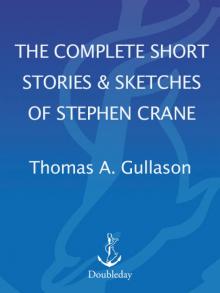 The Complete Short Stories and Sketches of Stephen Crane
The Complete Short Stories and Sketches of Stephen Crane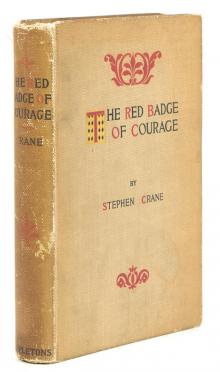 The Red Badge of Courage: An Episode of the American Civil War
The Red Badge of Courage: An Episode of the American Civil War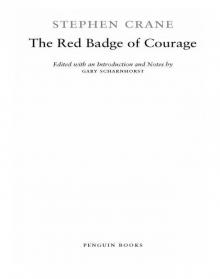 The Red Badge of Courage
The Red Badge of Courage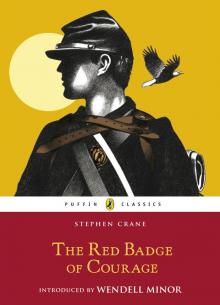 The Red Badge of Courage by Stephen Crane
The Red Badge of Courage by Stephen Crane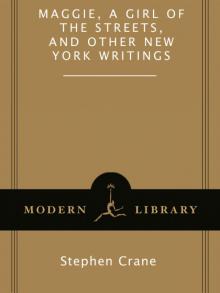 Maggie, a Girl of the Streets and Other New York Writings
Maggie, a Girl of the Streets and Other New York Writings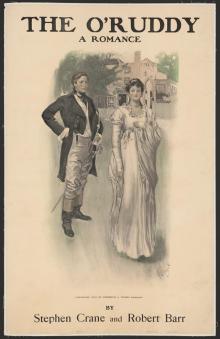 The O'Ruddy: A Romance
The O'Ruddy: A Romance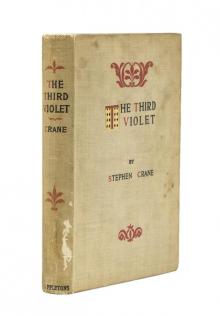 The Third Violet
The Third Violet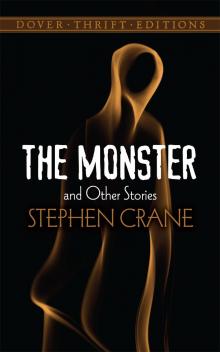 The Monster and Other Stories
The Monster and Other Stories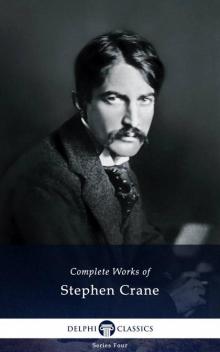 Complete Works of Stephen Crane
Complete Works of Stephen Crane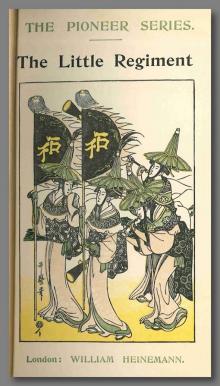 The Little Regiment, and Other Episodes of the American Civil War
The Little Regiment, and Other Episodes of the American Civil War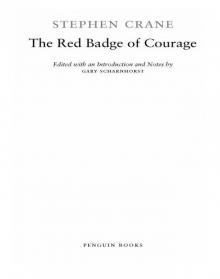 The Red Badge of Courage and Other Stories
The Red Badge of Courage and Other Stories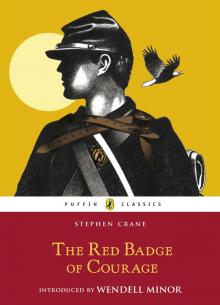 Red Badge of Courage (Puffin Classics Relaunch)
Red Badge of Courage (Puffin Classics Relaunch) The Fight: Whilomville Stories: XI.
The Fight: Whilomville Stories: XI. A Man and Some Others.
A Man and Some Others. The Monster
The Monster